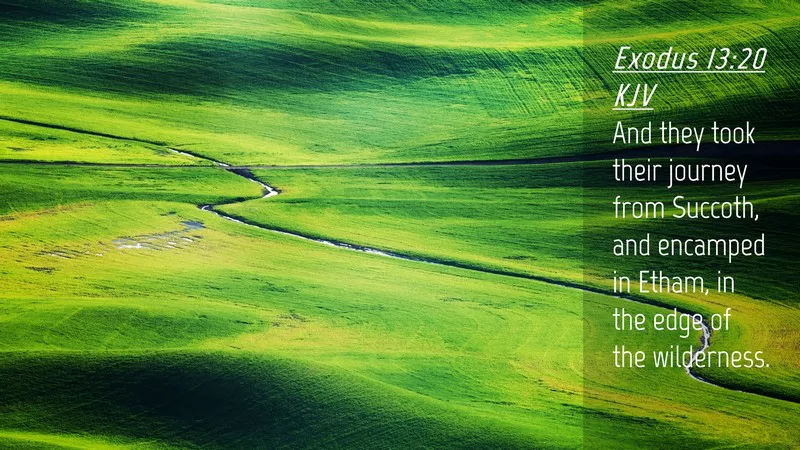Read the Daily Bible Verse – Exodus 13:20 To Strengthen Your Spiritual Journey.
Exodus 13:20 is a verse that reflects a pivotal moment in the journey of the Israelites as they leave Egypt under God’s guidance. The verse states:
“And they took their journey from Succoth, and encamped in Etham, in the edge of the wilderness.” (Exodus 13:20, KJV).
This passage, though concise, carries profound significance, marking the Israelites’ physical and spiritual transition from slavery to freedom. This article examines the context, meaning, and lessons of Exodus 13:20, its application in life, its relation to other biblical texts, and its modern-day relevance.
The Context on Exodus 13:20 KJV
To understand Exodus 13:20, we must first explore the context in which it is situated.
Historical Background
The book of Exodus records God’s deliverance of the Israelites from bondage in Egypt. After enduring centuries of slavery, the Israelites experience a series of miraculous events culminating in their release through the tenth plague, the death of the firstborn in Egypt.
In this chapter, the Israelites are beginning their journey to the Promised Land. God is leading them through Moses, guiding their movements to ensure their safety and spiritual growth.
Literary Context
Exodus 13 focuses on the initial stages of the journey, with instructions about consecrating the firstborn, observing the Feast of Unleavened Bread, and trusting in God’s guidance. Verse 20 specifically mentions the Israelites’ transition from Succoth to Etham, marking their movement toward the wilderness.
The Meaning of Exodus 13:20
Exodus 13:20 carries multiple layers of meaning, both in its historical significance and its spiritual symbolism.
Geographical Significance
Succoth: This location likely served as a temporary gathering place for the Israelites after their departure from Egypt. It symbolizes the first steps of freedom and collective movement as a nation.
Etham: Positioned at the edge of the wilderness, Etham represents the boundary between civilization and the unknown. It signifies a place of preparation, where the Israelites would rely on God as they ventured into unfamiliar territory.
Trust in Divine Guidance
The verse underscores the Israelites’ dependence on God for direction. Their journey, though geographically mapped, was ultimately led by divine wisdom, as indicated in the verses that follow, which describe God leading them through a pillar of cloud by day and fire by night (Exodus 13:21-22).
Transition and Transformation
The movement from Succoth to Etham symbolizes more than physical travel. It represents a transition from oppression to liberation and a transformation of identity, as the Israelites shift from being slaves to becoming God’s chosen people.
Exodus 13:20 Application in Life
The journey described in Exodus 13:20 provides timeless lessons for believers navigating their own spiritual paths.
Trusting in God’s Guidance
The Israelites’ willingness to follow God into the wilderness reflects a deep trust that believers can emulate. When faced with uncertainty, trusting in God’s wisdom and timing is essential.
Preparing for the Unknown
Etham, at the edge of the wilderness, symbolizes preparation. In life, believers often find themselves on the threshold of new challenges or opportunities. This verse encourages readiness and faith in God’s provision.
Embracing Spiritual Transformation
Just as the Israelites transitioned from slavery to freedom, believers are called to embrace spiritual transformation, leaving behind the bondage of sin and stepping into the freedom offered through Christ.
Comparison with Other Biblical Texts
Exodus 13:20 resonates with other biblical passages that explore themes of journey, guidance, and trust in God.
Numbers 33:5-6
This passage provides a detailed account of the Israelites’ journey, confirming their movement from Succoth to Etham. It highlights the careful documentation of their travels, underscoring God’s involvement at every step.
Psalm 23:3-4
The journey motif in Psalm 23 mirrors the themes of Exodus 13:20. Just as God led the Israelites, the psalmist describes God as a shepherd who guides His people through valleys and toward still waters.
Hebrews 11:8
Abraham’s journey to an unknown land by faith parallels the Israelites’ journey to the Promised Land. Both passages emphasize reliance on God’s promises and guidance.
Modern-Day Relevance
The themes of Exodus 13:20 remain profoundly relevant to believers today, offering guidance for navigating personal and communal challenges.
Guidance in Life’s Journey
Believers often face decisions that lead them into unfamiliar territory, much like the Israelites at Etham. This verse reminds them that God’s guidance is steadfast and reliable, even when the path is unclear.
Preparation for Growth
Etham serves as a reminder that periods of preparation are essential before embarking on significant endeavors. Believers are encouraged to view waiting and preparation as part of God’s plan.
A Call to Move Forward
The Israelites’ journey from Succoth to Etham represents progress. In modern life, believers are called to move forward in their faith, trusting God to lead them into new opportunities and challenges.
Conclusion
Exodus 13:20 captures a moment of transition, trust, and preparation in the Israelites’ journey to the Promised Land. It speaks to the importance of following God’s guidance, embracing transformation, and preparing for the challenges of the unknown.
This verse serves as a reminder that God’s presence accompanies believers through every stage of their journey, offering direction, hope, and assurance. By meditating on its lessons, modern believers can find inspiration to trust God’s plans and courage to move forward into the opportunities and challenges of life.
Exodus 13:20 Commentary
Biblical scholars provide various insights into the significance of Exodus 13:20.
Matthew Henry: He interprets this passage as a demonstration of God’s faithfulness, emphasizing the importance of following God’s lead, even into the wilderness.
John Gill: Gill highlights the geographical and symbolic significance of Etham, viewing it as a place where the Israelites prepared to witness God’s power and provision.
Albert Barnes: Barnes reflects on the transition represented by this verse, noting its role in setting the stage for God’s miraculous interventions in the wilderness.
You Might Be Interested In:


